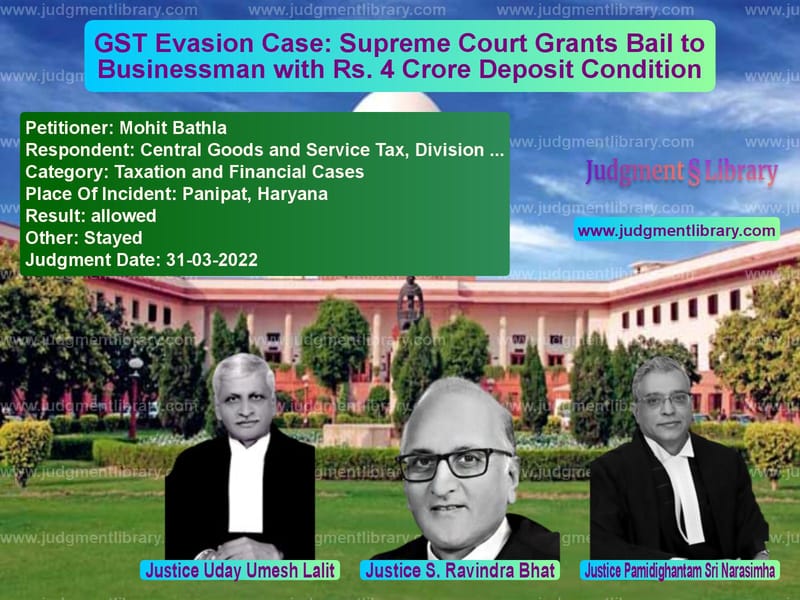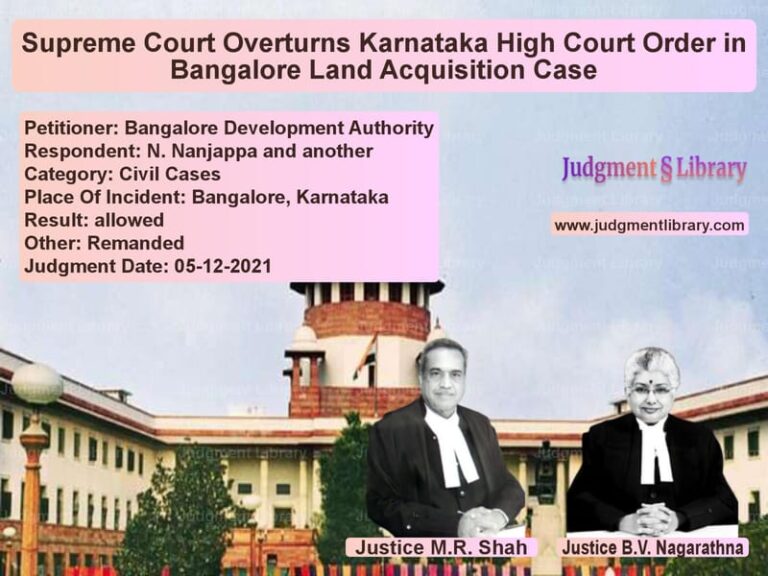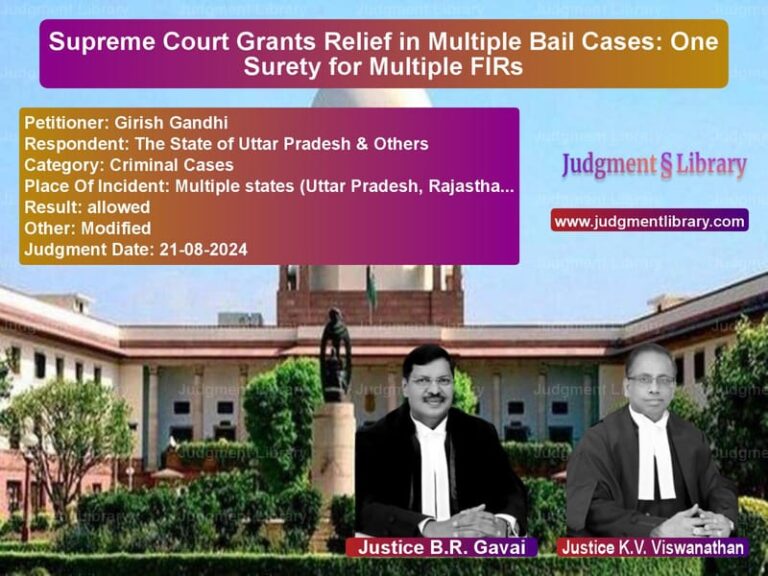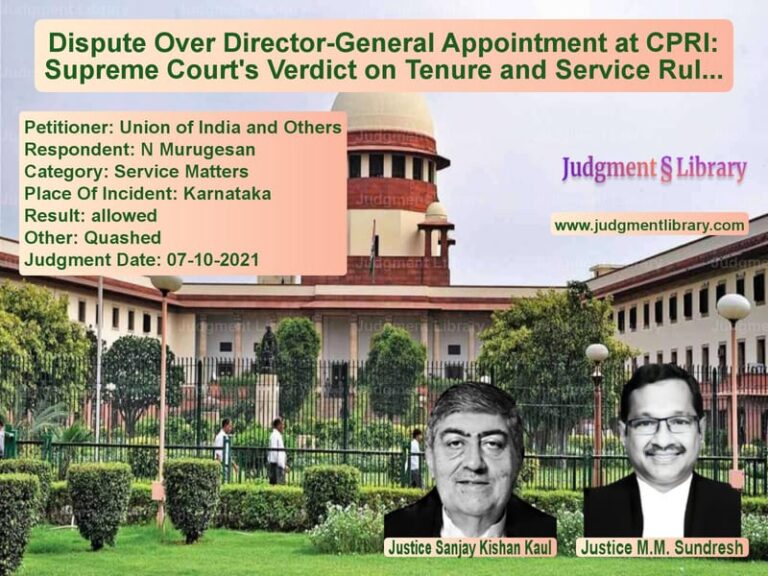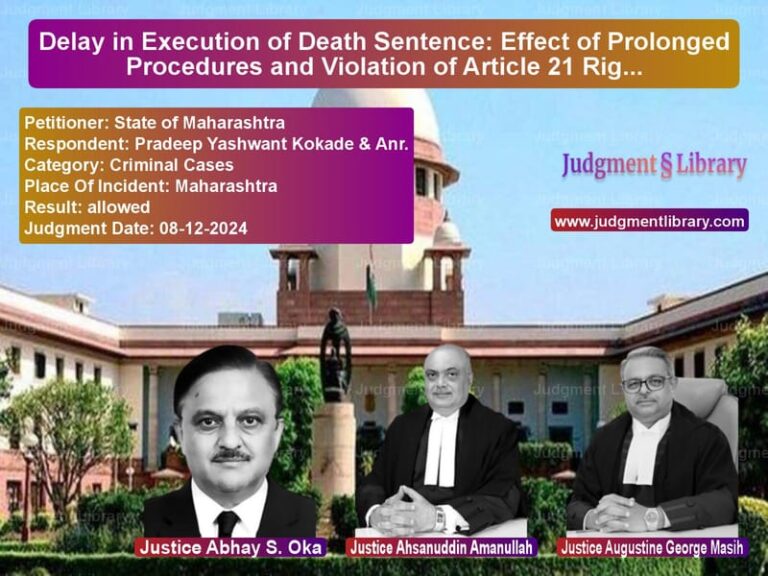GST Evasion Case: Supreme Court Grants Bail to Businessman with Rs. 4 Crore Deposit Condition
The case of Mohit Bathla vs. Central Goods and Service Tax, Division Panipat revolves around a serious allegation of tax evasion under the Central Goods and Services Tax (CGST) Act, 2017. The appellant was accused of large-scale tax fraud and arrested in December 2020. After multiple attempts to secure bail, his plea was denied by the Punjab and Haryana High Court. The Supreme Court, upon reviewing the case, granted bail under strict conditions, requiring the appellant to deposit Rs. 4 crores with the tax authorities.
This judgment is crucial in determining how financial offenses, particularly those related to tax evasion, are treated under Indian law. The Supreme Court’s decision provides a balanced approach, ensuring the accused does not evade legal proceedings while also considering individual rights.
Background of the Case
The case arose from a complaint registered on February 24, 2021, alleging that Mohit Bathla had committed offenses under Sections 132 and 134 of the CGST Act, 2017. The complaint accused him of fraudulently evading taxes, leading to his arrest on December 25, 2020.
Following his arrest, Mohit Bathla applied for bail under Section 439 of the Code of Criminal Procedure, 1973. However, the Punjab and Haryana High Court rejected his plea on March 24, 2021, citing the seriousness of the allegations. The appellant then approached the Supreme Court, seeking relief.
Allegations Against the Appellant
- The appellant was accused of fraudulently claiming input tax credit (ITC) without any actual transactions.
- Fake invoices worth several crores were allegedly generated to show non-existent sales and purchases.
- The fraud led to a significant loss of revenue to the government, prompting legal action.
- The authorities claimed that such tax evasion harms the country’s economy and must be dealt with strictly.
Arguments of the Petitioner (Mohit Bathla)
The petitioner, represented by Senior Advocate Anupam Lal Das, presented the following arguments before the Supreme Court:
- The appellant had already been in custody for several months and should be granted bail on humanitarian grounds.
- He was ready to comply with any conditions imposed by the Court, including monetary deposits.
- The case was primarily related to tax fraud, which is an economic offense, and does not require prolonged incarceration.
- Several co-accused in similar cases had been granted bail, and denying bail to the appellant was discriminatory.
- The delay in proceedings meant that the trial would take a long time, and keeping him in custody indefinitely was unjustified.
Arguments of the Respondent (CGST Department)
The Central Goods and Service Tax department, represented by Additional Solicitor General N. Venkataraman, strongly opposed the bail application:
- The allegations against the appellant were of a serious nature, involving large-scale tax fraud.
- Releasing the accused could lead to tampering with evidence or influencing witnesses.
- Granting bail in such cases could set a precedent that weakens tax enforcement measures.
- The appellant had not fully cooperated with the investigation and posed a flight risk.
Supreme Court’s Observations
The Supreme Court, comprising Justices Uday Umesh Lalit, S. Ravindra Bhat, and Pamidighantam Sri Narasimha, carefully reviewed the case.
The Court observed:
- The appellant had already deposited Rs. 4 crores with the tax authorities as per earlier directions.
- He had been on ad-interim bail since May 2021, subject to compliance with the financial conditions.
- The amount deposited should be held by the authorities until final orders are passed.
- While economic offenses are serious, prolonged incarceration must be justified based on evidence.
The Court emphasized:
“The appellant shall continue to be on bail on the same conditions on which he was allowed the facility of ad-interim bail. The security and documents of surety furnished at that stage shall continue to be operative as conditions of bail.”
Supreme Court’s Verdict
On March 31, 2022, the Supreme Court ruled:
- The appellant was granted regular bail on the same conditions as his interim bail.
- The security and documents submitted at the time of interim bail would remain valid.
- The Rs. 4 crore deposit would be subject to the final outcome of the case.
- If the appellant misused his liberty, bail could be revoked.
The Supreme Court also cautioned:
“The appellant shall not misuse his liberty in any manner and that any infraction may entail in withdrawal of the benefit granted in terms of the orders passed by this Court.”
Conclusion
The Supreme Court’s ruling in this case establishes several important legal principles:
- Bail conditions in financial crimes: Courts may impose financial obligations such as deposits to ensure compliance.
- Judicial balance in economic offenses: While tax evasion is a serious offense, indefinite detention without trial must be justified.
- Accountability of accused individuals: The decision ensures that while an accused is granted bail, he remains accountable to the authorities.
- Legal safeguards against bail misuse: The Court clarified that any misuse of bail conditions could lead to cancellation.
This judgment reinforces the principle that financial crimes should be addressed through legal and financial means rather than excessive incarceration.
Petitioner Name: Mohit Bathla.Respondent Name: Central Goods and Service Tax, Division Panipat.Judgment By: Justice Uday Umesh Lalit, Justice S. Ravindra Bhat, Justice Pamidighantam Sri Narasimha.Place Of Incident: Panipat, Haryana.Judgment Date: 31-03-2022.
Don’t miss out on the full details! Download the complete judgment in PDF format below and gain valuable insights instantly!
Download Judgment: mohit-bathla-vs-central-goods-and-se-supreme-court-of-india-judgment-dated-31-03-2022.pdf
Directly Download Judgment: Directly download this Judgment
See all petitions in Tax Evasion Cases
See all petitions in Banking Regulations
See all petitions in Income Tax Disputes
See all petitions in Judgment by Uday Umesh Lalit
See all petitions in Judgment by S Ravindra Bhat
See all petitions in Judgment by P.S. Narasimha
See all petitions in allowed
See all petitions in Stayed
See all petitions in supreme court of India judgments March 2022
See all petitions in 2022 judgments
See all posts in Taxation and Financial Cases Category
See all allowed petitions in Taxation and Financial Cases Category
See all Dismissed petitions in Taxation and Financial Cases Category
See all partially allowed petitions in Taxation and Financial Cases Category

